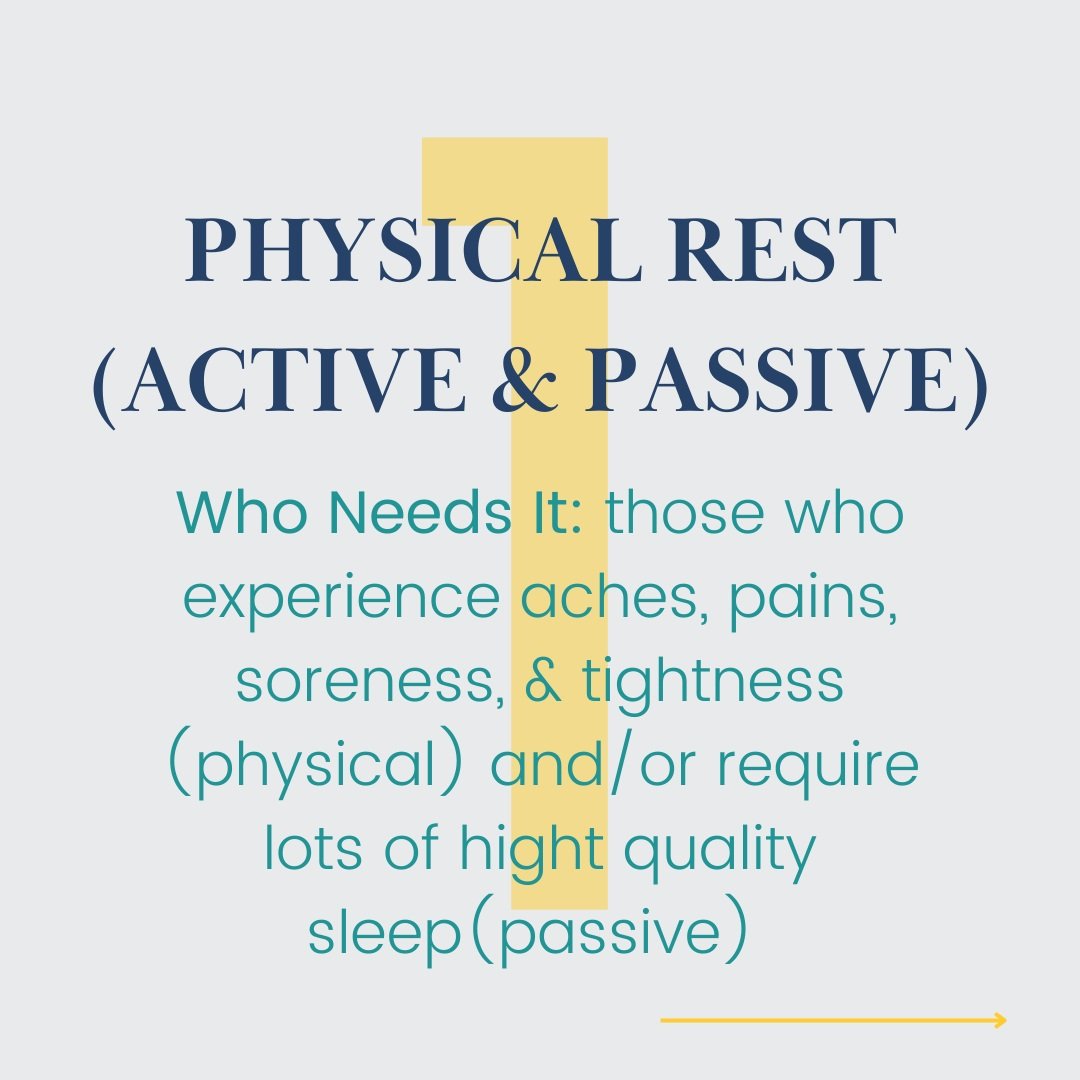The Importance of Rest
Are you constantly on the go? Moving non-stop… just go-go-go everyday with little to no time to slow down & rest before you do it all over again the next day? If this is you… then keep reading!
Being on this non-stop hamster wheel of busy-ness can lead to burn out, exhaustion & total energy depletion. Yes, you could sleep more & strive for better quality sleep – that’s a great start! But more & better sleep will not ascend you from complete burnout.
Typically, when we are tired, we don’t ask ourselves what “type of tired” we are. We just simply know that we’re tired & fatigued. But according to Dr. Saundra Dalton Smith, MD, there are 7 different areas of fatigue we experience & 7 related areas of rest that can combat our unexplained exhaustion. These are: physical rest, mental rest, emotional rest, social rest, sensory rest & creative rest – each type has its own characteristics that will present if you have a deficit.
1. Physical Rest: Physical rest is made up of 2 components, active & passive physical rest.
Who Needs It: individuals who experience pain, aches, tightness & soreness in their bodies (active physical rest) & the intense need to experience lots of high quality sleep (passive physical rest)
How To Get It: yoga, stretching, foam rolling, massage (active) & sleeping or napping (passive)
2. Mental Rest:
Who Needs It: Individuals whose mind races when trying to go to sleep & who have difficulty quieting their thoughts at night. Also people who have a hard time recalling information & concentrating during the day.
How To Get It: keep a journal next to your bed to unleash nagging thoughts onto a piece of paper before sleep. In addition, taking short breaks throughout the day to slow down.
3. Social Rest:
Who Needs It: individuals who spend most of their time with people who negatively pull from their social energy battery & constantly need things from you.
How To Get It: spend more time with the people who don’t need or expect anything from you, where you’re able to simply enjoy their company. In addition, schedule some time to spend with just yourself. Solitude can be incredibly nourishing & helpful in recharging your social energy.
4. Spiritual Rest:
Who Needs It: individuals with the need to feel like they belong & are contributing to a greater good. Most likely someone who just goes to work for the paycheck but feels little to no purpose in what they do.
How To Get It: discovering a way to connect to your purpose & desire for meaning – whether that’s through community, work culture, or faith-based culture. Discover what you’re passionate about & what lights your soul on fire… incorporate more of THAT into your daily life.
5. Sensory Rest:
Who Needs It: someone who is exposed to excess sensory input such as the sound of phones ringing in the background, bright lights on a computer, kids playing while you’re in your home office, notifications going off on your phone or email or even the visual backgrounds of people on a zoom call. Individuals who start their day feeling GREAT but can’t understand why at the end of the day you’re so irritable, angry & annoyed
How To Get It: simply closing your eyes for a minute or two in the middle of the day just to breathe without any external stimulation. Try to unplug from electronics completely at the end of the day. Or incorporate intentional moments of sensory deprivation by going into a quiet room just to breathe.
6. Emotional Rest:
Who Needs It: Individuals who feel like they are lacking the opportunities to be real & authentic in how they share their feelings. The people who carry quite a bit of emotional baggage – meaning they don’t share with people what they’re feeling. In addition, feeling like you never have the freedom to be truly authentic, feeling heaviness in your heart, mind & body because your emotions have piled up so high, and feeling that you always have to hold back.
How To Get It: find people in your life you can openly express your feelings to & share your inner world with – a therapist, a priest, a good friend, your partner, etc. Finding the space/time to unpack & unleash what’s being held prisoner in your mind & body.
7. Creative Rest:
Who Needs It: Individuals who have a hard time being innovative, experience difficulty brainstorming & problem solving. People who don’t spend enough time in nature & expose themselves to art.
How To Get It: Exposing yourself to more nature – if you live by hiking trails, go outside on the weekends to experience the beauty that nature provides in the trees & mountains. Even if you have some beautiful plants & flowers in your garden outside, spend some time out there to just appreciate the beauty that stems right from your backyard. Decorate your home office or bedroom with beautiful art that you find inspiring & healing to observe – find ways to express yourself creatively & be innovative.
Okay, so….. where the hell do I even begin: start with one area of rest that you’ve read about that resonates most with where you are feeling most depleted in life right now. You can’t tackle all at once so reflect & choose one that is most pressing at this moment. Luckily, Dr. Sandra has created a FREE quiz to help you narrow down just exactly what type of rest you’re needing most.
An important reminder when starting this journey of intentional rest… the restoration process must be something you can do at almost any time without a lot of limitations. That doesn’t mean taking a 3-month sabbatical. Rather, strategize small ways you can incorporate your most needed rest through the day, every day to finally feel re-energized again. Small amounts of restoration over a week are MUCH MORE EFFECTIVE than doing nothing at all. At least you’re pouring a little bit back into your cup little by little.
Happy resting!








